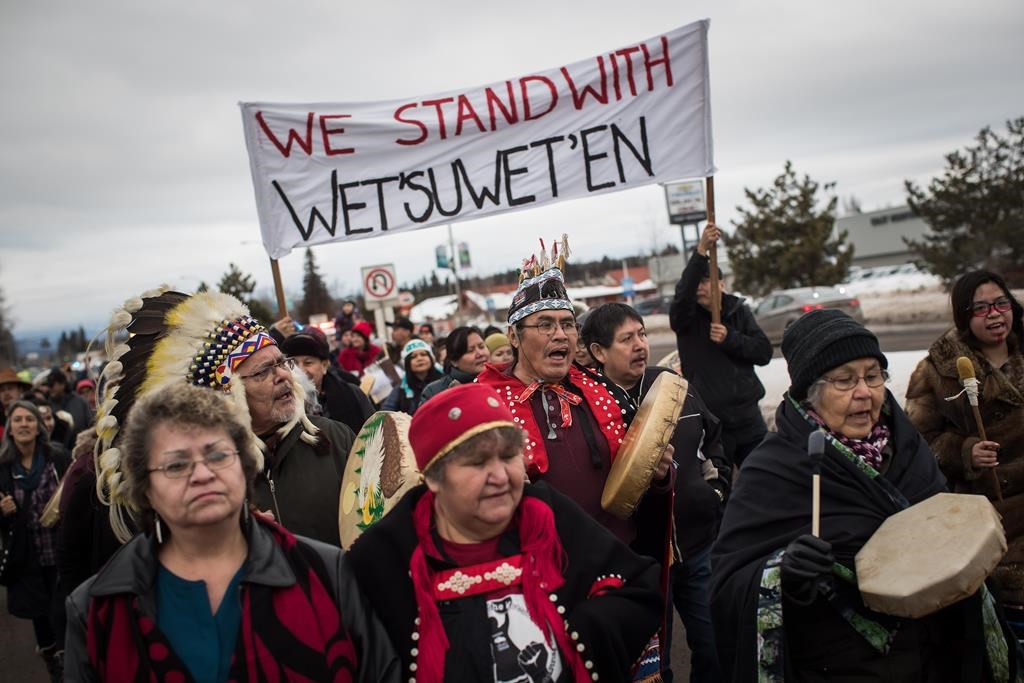BY ASH KELLY Posted Feb 14, 2020

FILE: Hereditary Chief Ronnie West, centre, from the Lake Babine First Nation, sings and beats a drum during a solidarity march after Indigenous nations and supporters gathered for a meeting to show support for the Wet'suwet'en Nation, in Smithers, B.C., on January 16, 2019. More than 200 Canadian musicians and industry players are standing in solidarity with people from a northern B.C. First Nation as they protest the construction of a natural gas pipeline on traditional territories. THE CANADIAN PRESS/Darryl Dyck
SUMMARY

Racism and hatred levelled at Indigenous people over demonstrations

Calls to kill protesters with vehicles and trains 'chipping away at our people' says Wet'suwet'en leader

'Consequence of colonialism' demonstrations spark racists backlash
VANCOUVER (NEWS 1130) – Wet’suwet’en and other Indigenous people are increasingly becoming the targets of racism and backlash as Canada-wide anti-pipeline demonstrations continue.
Online, hundreds of people have callously suggested drivers run over protesters in the streets, prompting concern from community members and chiefs about violence.
“Run ‘em over I guess, seems to be the only option available lol,” reads one comment, mirroring countless others that are not suitable to print.
It’s heartbreaking to watch from outside of his traditional territory, says hereditary wing Chief Andrew George Jr. of the Gidimt’en, Grizzly house, within the Wet’suwet’en Bear Clan.
“It’s now taking effect in the smaller communities in the north and I’m talking racism, systemic racism and it’s bad,” says George, whose traditional name is Skiten.
A wing chief is in line to become a house chief, and assists the house chiefs on issues pertaining to their clan, Skiten says.
He says he is particularly concerned about the safety of elders, women and girls.
Elders, he says, are not engaged in social media and many are being left out of the conversation.
“They’re being attacked in public, based on what is going on with the protests and stuff.”
In a news release Friday morning, Skiten says there is a direct correlation between violence against Indigenous people and resource development decisions.
He alleges the Coastal GasLink crisis has already raised concerns that elected band councillors are retaliating against people who don’t support the pipeline and protesters are “bullying Wet’suwet’en elders to acquire hereditary chief names.”
He adds there are rising tensions on Indigenous and settler relations.
Skiten says he worried about the physical safety of youth seen chaining themselves to cars, blocking train crossing and facing the anger of commuters inconvenienced by the wide-spread blockades, which is why he’s calling for an all-clan meeting.
But Chief Woos, also of the Grizzly House, says wing chiefs have no authority to call an all clans meeting.
“Our protocol is that the House Chiefs call the clan meetings, not wing chiefs. Media need to respect that,” he says, in a text message.
Skiten believes it is the duty of the chiefs to come together soon and work toward solving internal conflicts.
“It’s not just about a pipeline,” he says, “It’s about a governing body.”
‘Chipping away at our people’
As solidarity protesters succeed in their goal of “shutting down Canada,” racist vitriol seems easier to find than ever before.
“Just step on the gas and plow through,” says one commenter on Facebook while others called for trains to run down protesters in northern B.C. and Ontario.
That kind of blatant ignorance and calls for murder are hurting real people, just trying to go about their lives, says Skiten.
“It’s chipping away at our culture. It’s chipping away at our people,” he says, explaining he sees the demonstrations, blockades, and the entire fallout surrounding Coastal GasLink’s pipeline as a consequence of colonialism.
He says the Indian Act and unethical consultation practices are forcing Indigenous people to rise up and declare sovereignty in the face of continued colonialism.
“These are unceded territories. There was no consent given,” he says.
“It’s a known fact in Wet’suwet’en territories, 70 to 80 per cent of people live off reserve. So [government and industry] consulted with about 20 per cent of the population,” when consulting with band council and on-reserve members he notes.
Skiten says he believes a government-to-government relationship is in the cards and that things can still change for the better.
“I think people are weary of the unknown but this system has been in place for generations,” he says, adding he his family has carried hereditary names since pre-contact.
---30---
No comments:
Post a Comment